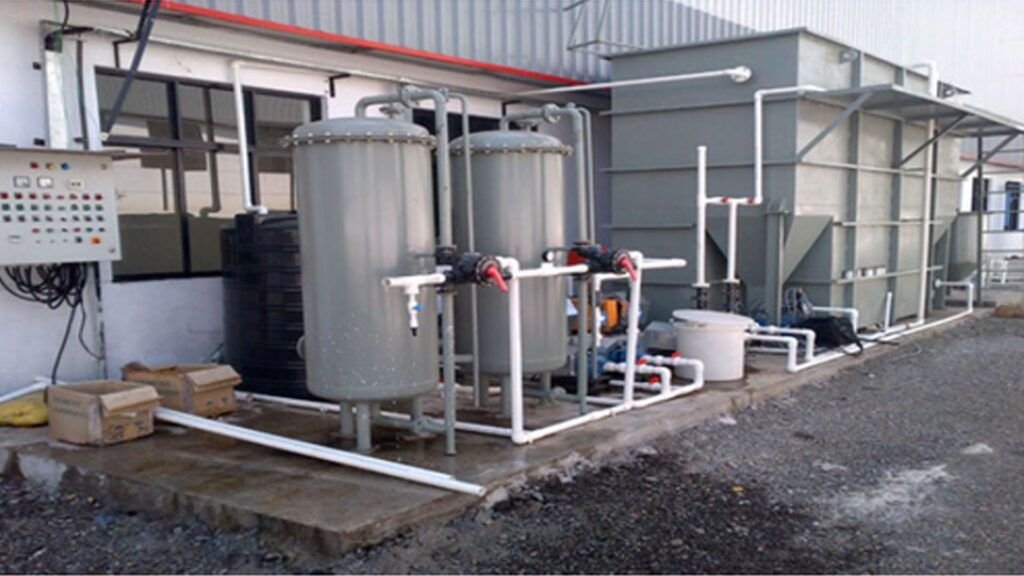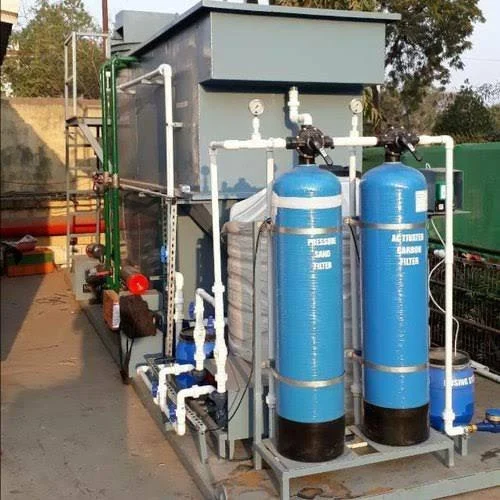SEWAGE TREATMENT PLANT IN MAHARASHTRA
Larco India Pvt Ltd: Your Trusted STP Manufacturers in Maharashtra
Located in the centre of Maharashtra, where wastewater treatment is a major concern, Larco India Pvt. Ltd. is one of the state’s leading STP manufacturers in maharashtra. Our unwavering dedication to environmental sustainability, adoption of state-of-the-art technology, and profound vision to turn wastewater into a precious asset make us the top pick for municipalities, industries, and communities throughout the state.



What is a STP (sewage treatment plant)?
A STP manufacturers in Maharashtra is a crucial infrastructure facility responsible for treating and purifying sewage or wastewater to make it safe for release into the environment or for a number of reuse applications. STP manufacturers in Maharashtra offer these vital systems in order to satisfy the state’s rising wastewater management needs.
Sewage is gathered from homes, businesses, and industrial locations, and sewage treatment plants are designed to clean the sewage of impurities, pollutants, and poisons. Pathogens, suspended particles, organic and inorganic compounds, nutrients, and other undesirable elements are frequently found in sewage.
There are several critical processes in the sewage treatment process, especially in Maharashtra, where environmental concerns are of the utmost importance:
- Primary Treatment: During this initial stage, techniques like screening and sedimentation physically separate large particles and debris from the sewage.
- Secondary Treatment: Two examples of biological techniques used in secondary treatment are trickling filters and activated sludge. Microorganisms are used to break down and digest organic material, resulting in less dangerous products.
- Tertiary Treatment: In STPs, tertiary treatment is an essential stage. Tertiary treatment improves water quality by removing any remaining pathogens and nutrients, as well as any contaminants that may be present.
- Disinfection: To ensure that the treated water is free of germs, such as bacteria, chlorine or ultraviolet (UV) light is used.
The constantly expanding urban centers and industrial sectors in Maharashtra necessitate effective sewage treatment. The STP providers in Maharashtra have met the challenge by offering cutting-edge sewage treatment technologies that satisfy both environmental regulations and the region’s unique needs.
Whether it involves home building, commercial construction, or municipal wastewater treatment, these manufacturers provide a range of STP systems that can frequently be altered to meet the requirements of particular projects. STP producers in Maharashtra greatly support the state’s initiatives in water conservation, pollution control, and sustainable development by utilizing cutting-edge technologies, upholding quality standards, and encouraging environmental responsibility.
Advantages Sewage Treatment Plants
Certainly, Sewage Treatment Plants (STPs) play a crucial role in wastewater management, especially in a densely populated and industrialized state like Maharashtra. Here are some of the key benefits of STPs:
- Environmental Protection: Toxins and dangerous pollutants are effectively removed from sewage by Sewage Treatment Plants (STPs). This crucial procedure considerably lowers the release of dangerous materials into sources of untreated water.
- Disease Prevention: STPs manufacurer in Maharashtra significantly reduce the risk of waterborne diseases by eliminating harmful germs contained in sewage. As a result, public health outcomes are better, and the water is safe for consumption and leisure.
- Water resource conservation: In Maharashtra and other water-scarce regions, cleaned wastewater can be recycled and used for industrial and agricultural processes as well as other non-potable uses. By doing this, significant freshwater resources are protected.
- Agricultural Support: The Maharashtra agricultural industry benefits from the reuse of treated wastewater in agriculture since it promotes crop growth. Additionally, it promotes state-wide food security.
- Industrial Sustainability: Industries in Maharashtra gain from having a steady supply of treated water since it lessens their reliance on freshwater and encourages environmentally friendly industrial procedures.
- Tourism and Aesthetics: Around tourist destinations, STPs enhance the local ecosystem and water resources. As a result, tourists are attracted, boosting Maharashtra’s tourism economy while also improving the ecology and water bodies.
- Groundwater Recharge: The balance of groundwater resources can be maintained by using treated wastewater to recharge aquifers.
- Compliance with Regulations: STPs promote adherence to environmental regulations and standards in order to assist Maharashtra in avoiding fines and legal repercussions for improper wastewater outflow.
- Climate Change Mitigation: In order to create biogas from sewage sludge, some STPs use anaerobic digestion, a renewable energy source that lowers greenhouse gas emissions and aids Maharashtra’s attempts to adapt to climate change.
- Quality of Life Enhancement: Maharashtra becomes a more desirable and sustainable location to live and work when people have access to clean water and a healthy environment.
STP manufacturers in Maharashtra are essential in offering cutting-edge sewage treatment options that meet the state’s particular requirements and environmental concerns. Their cutting-edge technologies and knowledge greatly support Maharashtra’s initiatives for environmental protection, sustainable growth, and the welfare of its people.
STP Functions
Managing and purifying sewage or wastewater effectively depends on sewage treatment plants (STPs). STP manufacturers in Maharashtra have been crucial in developing systems that carry out a number of crucial tasks to guarantee that sewage is treated effectively and securely. The following are a sewage treatment plant’s main duties:
- Screening: Many STPs start by screening the incoming sewage to get rid of big waste like sticks, leaves, plastics, and other solid materials. This keeps the equipment downstream from being clogged or damaged by this debris.
- Primary Treatment: Sewage is subjected to physical processes like sedimentation and settling during the first treatment phase. This makes it possible to separate the liquid component from the heavier materials, often known as primary sludge. The organic load and solids content of the wastewater are decreased during first treatment.
- Secondary Treatment: A biological procedure called secondary treatment involves adding microorganisms to the sewage. These microbes convert the organic material in the wastewater into less dangerous chemicals by breaking it down. The concentration of contaminants in the sewage is greatly lowered by this method.
- Tertiary Treatment: Tertiary treatment concentrates on further modifying the sewage to fulfill certain water quality criteria and is frequently necessary in regions like Maharashtra. To get rid of any remaining pollutants, nutrients, and pathogens, more filtration and chemical procedures are used. Water treated with tertiary treatment is of the highest grade and is safe for reuse or disposal.
- Disinfection: The removal or inactivation of potentially dangerous microorganisms (bacteria, viruses, etc.) that may still be present in the treated sewage is a crucial function of disinfection. Chlorination, UV light therapy, and ozonation are frequently used disinfection techniques.
- Sludge Handling: Primary and secondary sludge are among the solid waste products removed from the sewage and collected throughout the treatment process. Additional processing of these solids involves dewatering and perhaps anaerobic digestion. The resulting sludge can be safely disposed of or used to generate electricity, among other things.
- Effluent Quality Monitoring: To make sure that the treated water meets regulatory criteria, it is essential to continuously monitor the effluent’s quality. In order to do this, measurements must be made for variables such as pH, turbidity, chemical oxygen demand (COD), and biological oxygen demand (BOD).
- Recycling and Reuse: Treated wastewater is frequently recycled and reused for non-potable uses like irrigation, industrial activities, and cooling water in areas like Maharashtra where water supplies are limited. STPs are set up to make this process easier, which helps with water savings.
- Environmental Compliance: STPs are created and run in a way that complies with environmental laws and guidelines. Manufacturers are crucial in ensuring that STPs adhere to these regulations, which helps safeguard the environment and general welfare.
- Energy Generation: Some STPs use anaerobic digestion technology to produce biogas from sewage sludge. The use of this biogas as a renewable energy source for generating electricity advances sustainability objectives.
STPs are intricate systems that carry out a variety of tasks to successfully treat sewage. STP manufacturers in Maharashtra have played a significant role in delivering cutting-edge solutions that are compatible with the state’s particular requirements for wastewater management and environmental considerations. Their proficiency in STP design, construction, and upkeep is essential for providing clean water and a healthier environment for the area.
